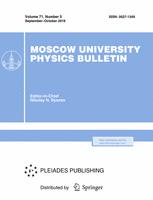The influence of the transverse segmentation of the silicon semiconductor detector system and the distance between the layers in the system on the fluctuation of the total energy deposition in the detector material during the passage of relativistic nuclei through it has been considered using modeling in the Geant4 software package. The modeling has shown that for relativistic nuclei, the energy depositions in the detectors of the series are not statistically independent, and the fluctuations of the total energy deposition significantly depend on the distance between the layers of the system. Thus, a significant influence of energetic delta electrons, formed during the interaction of the nucleus with the passage medium, on the total energy deposition, and mainly on its fluctuations, has been demonstrated.
$^1$M.V. Lomonosov Moscow State University\
$^2$3 Skobeltsyn Institute of Nuclear Physics, Moskow 119991, Russia.



